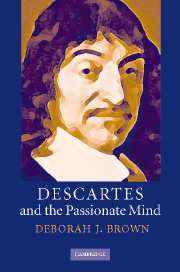Book contents
- Frontmatter
- Contents
- Acknowledgements
- Note on references
- Introduction
- 1 Volo ergo sum: the unity and significance of Les Passions de l'âme
- 2 Perturbations or sweet pleasures? Descartes' place in two traditions regarding the passions
- 3 The natural integration of reason and passion
- 4 Representing and referring
- 5 Action and passion: metaphysical integrationism
- 6 Wonder and love: extending the boundaries of the Cartesian knower and the Cartesian self
- 7 Several strange passages on desire and fortune
- 8 Generosity breeds content: self-mastery through self-esteem
- Bibliography
- Index
2 - Perturbations or sweet pleasures? Descartes' place in two traditions regarding the passions
Published online by Cambridge University Press: 15 December 2009
- Frontmatter
- Contents
- Acknowledgements
- Note on references
- Introduction
- 1 Volo ergo sum: the unity and significance of Les Passions de l'âme
- 2 Perturbations or sweet pleasures? Descartes' place in two traditions regarding the passions
- 3 The natural integration of reason and passion
- 4 Representing and referring
- 5 Action and passion: metaphysical integrationism
- 6 Wonder and love: extending the boundaries of the Cartesian knower and the Cartesian self
- 7 Several strange passages on desire and fortune
- 8 Generosity breeds content: self-mastery through self-esteem
- Bibliography
- Index
Summary
Had this excellent Man, Monseiur des Cartes, been half as conversant in Anatomy, as he seems to have been in Geometry, doubtless he would never have lodged so noble a guest as the Rational Soul in so incommodious a closet of the brain, as the Glandula Pinealis is; the use whereof hath been demonstrated to be no other but to receive into its spongy cavities, from two little nerves, a certain serous Excrement, and to exonerate the same again into its vein, which nature hath therefore made much larger than the artery that accompanieth it; and which having no communication with the external organs of the senses, cannot with any colour of reason be thought the part of the brain wherein the Soul exerciseth her principal faculties of judging and commanding.
(Charleton, 1674: preface)Of the many accusations thrown at Descartes by contemporary philosophers, the strangest is surely the cognitivist's one which holds him accountable for having reduced emotions to ‘mere feelings’ or ‘the rush of animal spirits to the brain’. Were it so, Les passions de l'âme should have fallen stillborn from the press, for its principal neuroanatomical claim – that the pineal gland is the ‘seat’ of mind–body interaction – was met with a substantial amount of derision. This is not to say that the text was not significant as a piece of natural philosophy in its time, but its influence has more to do with the way questions about the passions were formed, rather than the particular answers that were given.
- Type
- Chapter
- Information
- Descartes and the Passionate Mind , pp. 28 - 54Publisher: Cambridge University PressPrint publication year: 2006



